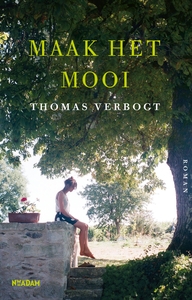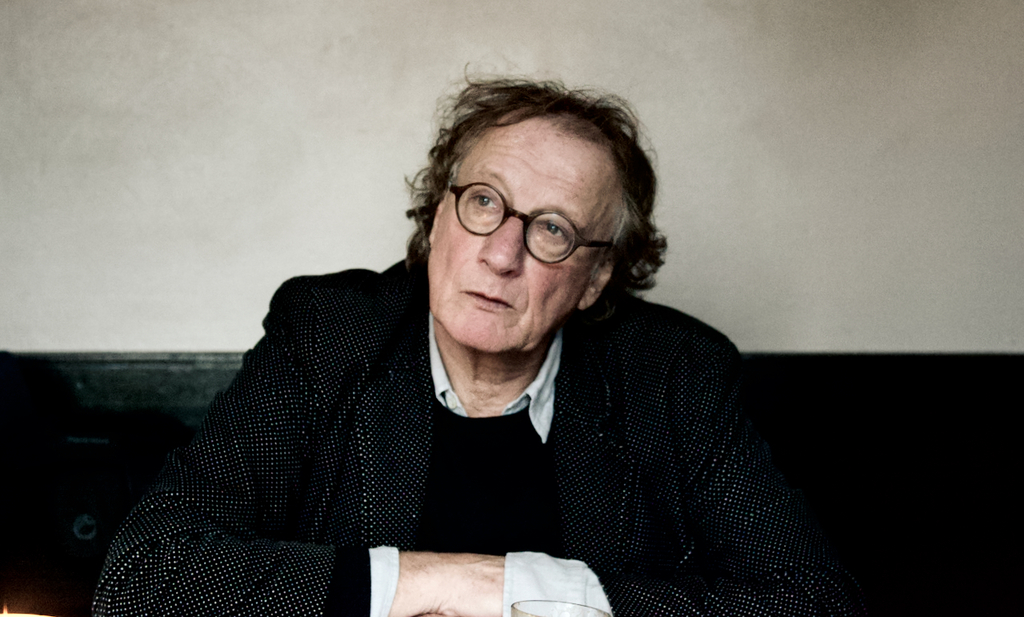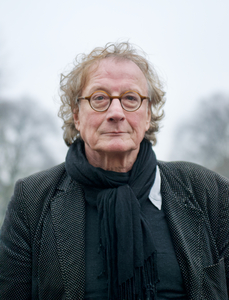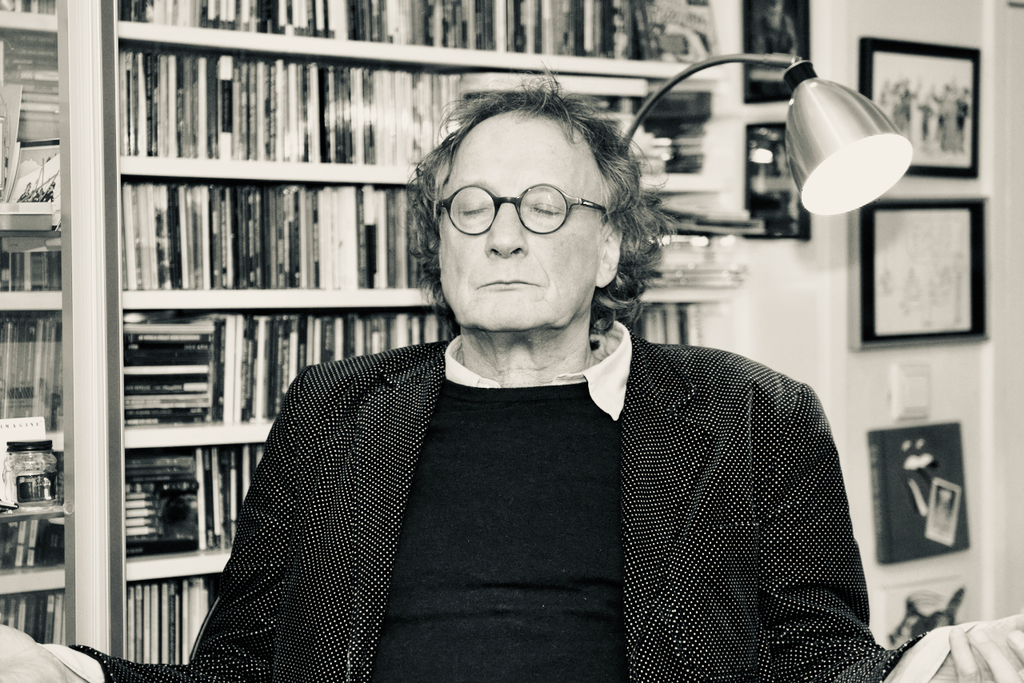Maak het mooi is de titel van zijn nieuwe roman, maar eigenlijk was het een boek dat Thomas Verbogt (69) al vele jaren vanbinnen met zich meedroeg. Nu het dan eindelijk geschreven is, voelt hij zich lichter.
Goed mens
Hoe kun je van wezenlijke betekenis zijn voor een ander? En wat moet je doen om een goed mens te zijn? Om die vragen cirkelt Maak het mooi, het fijngevoelige nieuwe boek van Thomas Verbogt. Een rijke roman over tijd en herinneringen, waarheid en werkelijkheid, over verbinding, verlies en afscheid, over schaamte en schuld. Hoofdpersoon is Thomas, een schrijver van eind zestig, die terugdenkt aan de stad waar hij opgroeide – Nijmegen – en de belangrijke momenten en mensen in zijn leven.

Zo is daar Jana, het meisje met wie hij als kind op de dag van zijn communiefeest een blik uitwisselt die hem het gevoel geeft dat hij opnieuw wordt geboren. En er is Nienke, een jonge vrouw met wie Thomas een kortstondige relatie heeft en die bijzonder genoeg later de zus van Jana blijkt te zijn. Hoewel hij Jana belooft naar Nienke te blijven omkijken, maakt zij op een dag een einde aan haar leven.
Samen ouder geworden
Maak het mooi was een roman die hij op een bepaalde manier al lang bij zich droeg, vertelt Verbogt, al sinds zijn jeugd in Nijmegen. ‘Voor mijn gevoel is dit boek al begonnen in dat magische park vlak bij ons huis, het Kronenburgerpark, waar ik heb leren lopen. Dat is misschien een romantische opvatting, maar toch denk ik dat het zo is. Dit boek is samen met mij ouder geworden, en steeds voller.
Toen ik tijdens de lockdown mijn werkkamer opruimde en veel uit het verleden tegenkwam, ook oude aantekeningen en notitieboekjes, voelde ik: nu moeten dat boek en ik uit elkaar, het moet een eigen leven gaan leiden, en dat leven ga ik het nu geven. Maar dat betekent niet dat het makkelijk was om het op papier te krijgen.’

Wat maakte het lastig?
‘Het verhaal raakte me vaak en diep. Toen ik het af had, was ik echt ontdaan. In de figuurlijke betekenis, dus emotioneel ontdaan, maar ook letterlijk, omdat ik me had ontdaan van dit verhaal. Het brandpunt van de roman was de scène waarin de hoofdpersoon Thomas een bezoek brengt aan de psychiatrische inrichting waar Nienke verblijft en hij ontdekt dat zij de vorige dag zichzelf van het leven heeft beroofd. Een samenvatting van alles wat mij niet is gelukt in het leven; van alles waarvoor ik verantwoordelijkheid had willen nemen, maar toch niet ten volle genomen héb.
In eerdere romans – en in deze voor het laatst – heb ik al geschreven over schuld en schaamte, gevoelens die ik heb doordat ik doodziek werd toen ik 3 was. Ik lag met hersenvliesontsteking in het ziekenhuis en men was bang dat ik dood zou gaan. Ik had een vaag besef dat ik voor mijn ouders, die tot dat moment zo gelukkig met mij waren geweest, een bron van zorg, verdriet en teleurstelling was geworden. Hoewel ik op latere leeftijd natuurlijk best begreep dat ik daar niets aan kon doen en er dus geen schuld aan had, is dat schuldgevoel wel diep in mijn emotionele systeem gaan zitten.
Tegelijk heeft die tijd dat ik afgeschermd van iedereen in mijn eentje in het ziekenhuis lag, ook iets goeds opgeleverd. Want het zorgde ervoor dat ik ging fantaseren: ik ben hier niet, ik ben thuis aan het spelen. Ik stelde me dat zó intens voor dat ik gewoon vergat dat ik ziek in die couveuse lag. Toen ik na maanden thuiskwam en opnieuw moest leren lopen omdat ik tijdelijk verlamd was geweest, kon ik niet meer ophouden met het verzinnen van een werkelijkheid naast de dagelijkse werkelijkheid waarin ik functioneren moest.’
Was dat de bron voor uw schrijverschap?
‘Dat weet ik wel zeker. In die bedachte werkelijkheid was ik zélf de baas. Op momenten dat er iets misging in mijn leven en ik ondergedompeld raakte in donkere gedachten, heeft schrijven me altijd geholpen. Dat heb ik nog steeds, bijvoorbeeld in de periodes waarin ik veel nachtmerries heb en schemerig wakker word, met een grimmig verzet tegen de nieuwe dag. Dan is het steeds weer een zegen dat ik elke ochtend een column moet schrijven, een luchtig stukje over mijn verwondering over het dagelijks leven. In het leven dat ik bedenk, verdwijnt de donkerte.

Mijn boek speelt met de vraag wat waar is en wat niet. Is iets wat niet waar is maar waarin je toch heel sterk gelooft, niet eigenlijk óók waar? Een van mijn zussen ging 25 jaar geleden in Athene wonen. In de brieven die ik haar schreef, vertelde ik wat ik had meegemaakt. Daar verzon ik ongemerkt van alles omheen. Hetzelfde gebeurde ook bij het dagboek dat ik jaren geleden moest bijhouden toen ik een tijd een therapeut bezocht. Dat gaat automatisch; wat ik vertel, blijft nooit alleen bij de feiten. Zonder dat ik er erg in heb, maak ik het leven intenser, inniger en avontuurlijker dan het is.’
In uw werk zijn niet alleen de werkelijkheid en waarheid diffuus, ook de tijd is niet afgebakend.
‘Zo ervaar ik dat in het gewone leven, maar ook in het schrijven. Als ik schrijf dat Nienke en Thomas op een winderige dag in Normandië naar de zee kijken, dan sta ik daar zelf. En als ik iemand tegenkom die ik 30 jaar geleden voor het laatst heb gezien, dan ben ik weer dáár, op dat moment. Eigenlijk is er geen onderscheid tussen heden en verleden. Als ik me iets herinner wat ooit van belang was, dan dient dat belang zich opnieuw aan. Herinneringen worden dus eigenlijk weer actualiteiten.’
Of zoals u schrijft: niets eindigt ooit echt.
‘Ja, zo is het. Dat is troostrijk als het gaat om gestorven dierbaren. Mijn overleden schrijversvriend Frans Kusters of mijn ouders hoor ik geregeld. Ze zijn er nog gewoon, ook al zijn ze niet meer fysiek aanwezig. Ook het kind in mij is nooit weg; ik ben een oude man en een jongen tegelijk. Als ik over mezelf schrijf als 19-jarige, dan ben ik al die dagen weer even 19 jaar. Dat is een grote gunst van dit werk, van het leven dat ik gekozen heb. Door te schrijven kan ik mezelf een tijdloos leven geven.’
Het leven mooi maken
Maak het mooi: voelt u dat als uw opdracht?
‘Ja, door wat ik schrijf, moet ik het leven mooi maken. De titel is ontleend aan een gedicht van de Palestijnse dichter Hala Alyan, dat ik een paar jaar geleden las in The New Yorker. De inhoud komt erop neer dat alles vergaat – dus maak het mooi. Dat doe ik in mijn romans, door licht te schrijven, ook over ernstige zaken. En dat doe ik in mijn columns, door te schrijven over kleine dagelijkse zaken en die mooi te maken, terwijl in de rest van de krant het leven met al zijn verschrikkingen, oorlog, armoede en natuurrampen op de mens afkomt. Schoonheid is troostrijk en veilig. Natuurlijk gaat ook dat voorbij; het boek is uit, de film of cd is afgelopen, je loopt het museum uit. Maar je hebt het meegemaakt, iets wat koesterend voelde.’
Voor uzelf is schrijven ook helend. Voelt u zich ‘ontdaan’ van uw schuldgevoel?
‘Ja, ik voel me verlicht en sterker. Nadat ik Als de winter voorbij is, Hoe alles moest beginnen en Als je de stilte ziet had geschreven, drie persoonlijke boeken, was er ruimte voor. Bij die romans bleef ik nog tegen die thematiek aan hangen, maar nu is het echt weg. Ik heb er de juiste woorden aan kunnen geven. De cirkel is rond.
Door te schrijven, woorden te zoeken voor wat ik heb gevoeld en meegemaakt, ben ik mezelf beter gaan begrijpen. Ik denk niet zo na over het doel of de zin van het leven, maar het lijkt me wel van belang dat je weet wat je in je leven aan het doen bent, wat je nog moet doen, wat je nagelaten hebt en wat je niet had moeten nalaten. Daar moet je niet langsheen leven. Een tijd geleden besefte ik dat ik mezelf niet de tijd en ruimte gaf om bij gebeurtenissen langdurig stil te staan. Neem het overlijden van mijn moeder, zes jaar geleden, toen ze 92 was. Pas een paar jaar na haar dood begon ik na te denken over het leven dat wij samen deelden na de dood van mijn vader, de gesprekken die we voerden. Dat ik daar pas zo laat over nadacht, vind ik erg. Stilstaan bij en nadenken over wat je meemaakt, is van belang om te begrijpen wat je moet doen om een goed mens te zijn.’

Een mooie en belangrijke vraag.
‘Dank je wel dat je dat zegt. Want er zijn ook mensen die daar gelijk cynisch over zouden doen. Voor mij is dit een boek tégen cynisme, want dat vind ik een gemakzuchtige manier van leven. Cynisme is hard en honend, en belemmert je in de vrijheid jezelf te zijn. Veel van wat van belang is in het leven, is kwetsbaar. Daarom is tederheid een wezenlijke dynamiek; we zouden zachter met elkaar moeten omgaan.’
Biedt uw bedachte wereld bescherming tegen die hardheid?
‘Ja, ik denk niet dat ik op een andere manier had kunnen leven met mijn hypersensitiviteit. Ik voel wat er gaat gebeuren voordat het is gebeurd, wat mensen eigenlijk bedoelen terwijl ze iets anders zeggen. Dat is heftig. Agressie, geschreeuw – daar heb ik last van en dat bedrukt me. Schrijven is een verschansing tegen de hardheid van de buitenwereld. In mijn werkkamer kies ik zélf de woorden, de kleuren, de toon. En omgekeerd maakt dat me ook weer sterker in de omgang met de buitenwereld.’
